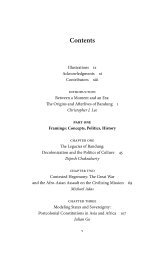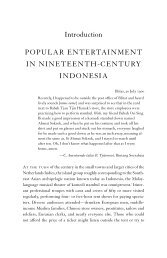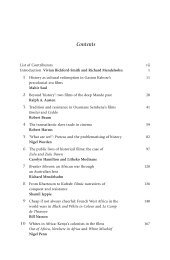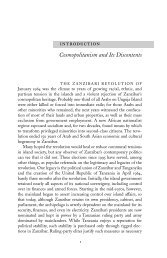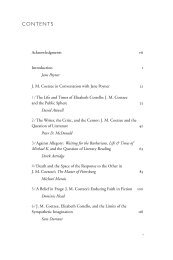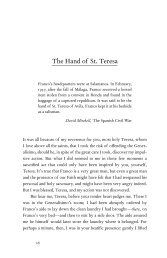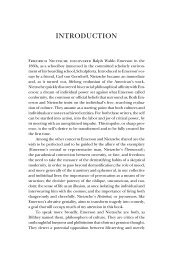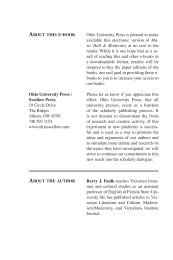Oscar Wilde and Modern Culture - Ohio University Press & Swallow ...
Oscar Wilde and Modern Culture - Ohio University Press & Swallow ...
Oscar Wilde and Modern Culture - Ohio University Press & Swallow ...
You also want an ePaper? Increase the reach of your titles
YUMPU automatically turns print PDFs into web optimized ePapers that Google loves.
was the woman protagonist to subscribe to the Victorian moralizing that <strong>Wilde</strong> did<br />
everything he could to resist in his work. Clearly, the subject matter, for its time,<br />
was risk-taking, as Laurel Brake explains in chapter 8 of the present volume.<br />
In all likelihood, <strong>Wilde</strong> would have developed the scenario into a full-fledged<br />
drama had the trials of April–May 1895 not taken place. His sketch of this ambitious<br />
play counts among the small number of dramatic works that <strong>Wilde</strong> left<br />
unfinished at the time of his death.₁⁰ In February 1895, just after the opening of<br />
Earnest, <strong>Wilde</strong> tried to interest Alex<strong>and</strong>er in “the vital parts” of A Florentine<br />
Tragedy, the fragment of which would appear in the fourteen-volume Collected<br />
Works (1908), edited by Ross.₁₁ <strong>Wilde</strong> appears to have continued working on<br />
this revenge drama, which follows the style of a Jacobean tragedy, until his hazardous<br />
libel suit interrupted his career. Besides resulting in his imprisonment,<br />
<strong>Wilde</strong>’s failed case against Queensberry incurred massive damages. On 24 April<br />
1895, his belongings went up for sale outside his beautifully furnished home<br />
at 16 Tite Street, Chelsea. <strong>Wilde</strong> therefore entered jail a bankrupt man, <strong>and</strong> at<br />
the end of his life, more than £1,000 was still owed to the official receiver. After<br />
his release from prison, when he moved around France <strong>and</strong> Italy incognito as<br />
“Sebastian Melmoth,” <strong>Wilde</strong> never recovered pecuniary stability, even though<br />
friends were at times generous to him.<br />
Once <strong>Wilde</strong> left Engl<strong>and</strong> for the Continent, he realized that the scenario he had<br />
shared with Alex<strong>and</strong>er in 1894 could reap much-needed rewards. In the summer<br />
of 1897, while he resided near Dieppe, Norm<strong>and</strong>y, he sold the performance rights<br />
to American actress Cora Brown-Potter. The following year, when his expenses<br />
outstripped his income, he did the same thing to English theatrical manager<br />
Horace Sedger, who promptly sold on the rights to another agent. At the end of<br />
1898, Leonard Smithers—a dubious figure who was the only publisher to accept<br />
<strong>Wilde</strong>’s Ballad of Reading Gaol (1898)—relieved the other agent (his name was<br />
Roberts) of the deal <strong>and</strong> quickly took steps to ensure that <strong>Wilde</strong> would settle at<br />
Paris, where he could work on the script. But even Smithers’s support did not inspire<br />
<strong>Wilde</strong> to finish the drama. Laurence Housman, who enjoyed <strong>Wilde</strong>’s company<br />
in September 1899, reports <strong>Wilde</strong>’s demoralization at the prospect that<br />
there was no further market for his literary works: “If I could write what I have<br />
been saying to you, if I could hope to interest others, as I seem to have interested<br />
you, I would; but the world will not listen to me—now.” ₁ ²<br />
Around this time, <strong>Wilde</strong> was so hard-pressed for cash that the proprietor of<br />
the Hotel Marsollier (where he had been staying during the early summer of 1899)<br />
Introduction 5



